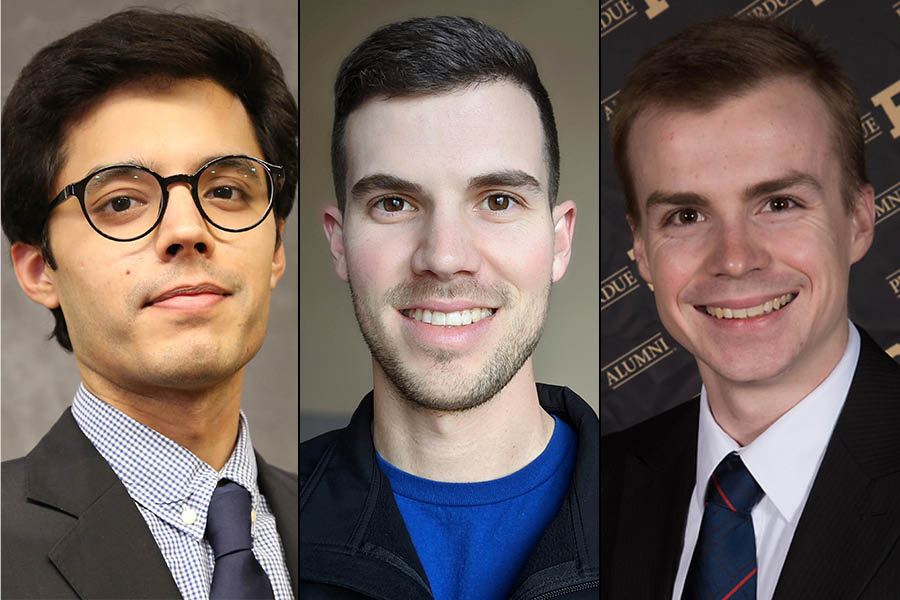Three AAE students awarded Bilsland Dissertation Fellowship

Three AAE graduate students have been awarded the Bilsland Dissertation Fellowship.
Hashim Hassan, Logan Kamperschroer and Paul Witsberger were nominated by the AAE Graduate Committee and Awards Committee and selected by the Dean of Purdue’s Graduate School. Each recipient will receive a base salary of $20,000, a supplemental salary of $7,000, a graduate tuition remission for up to two semesters and one summer session (approximately $35,000) and an annual medical insurance premium contribution.
Recipients are expected to devote full-time effort to the completion of all doctoral degree requirements at the conclusion of the year of funding.
The three finalists from AAE were selected by the AAE Graduate Committee and Awards Committee from a group of outstanding AAE Ph.D. students who were nominated.
Hassan’s research is at the confluence of materials science and structural health monitoring. Aerospace structures accumulate damage over their service lives. This damage, if left unchecked, can precipitate catastrophic failure. Structural health monitoring allows continuous monitoring of the state of damage within a structure. Hassan’s research is developing advanced materials with intrinsic capabilities that allow them to continuously “sense” damage.
“These materials have immense potential to improve the safety of future aircraft and spacecraft because they allow us to preemptively predict when the structure will fail,” Hassan said. “I am incredibly honored and humbled to have received the Bilsland Fellowship. I thank the AAE department and the Graduate School for selecting me from among so many deserving applicants. I would also like to thank my advisor, Professor Tyler Tallman, for his continued support and advice. I can now focus entirely on completing my research and writing my dissertation.”
Under advisor Timothee Pourpoint, Kamperschroer’s research is on the discovery and development of less-toxic hypergolic propellants for in-space propulsion applications. Using high-speed data acquisition systems in combustion experiments and chemical analyses, he evaluates new propellant candidates and demonstrates them in laboratory-scale rocket engines.
“I am very thankful for being selected for this year’s fellowship as it will allow me to progress in my research far beyond what I could have before and make a larger impact on the community,” Kamperschroer said.
Witsberger’s research involves using machine learning to address the missed-thrust problem in interplanetary spacecraft trajectory design. Many trajectory design methods focus on finding trajectories that use as little propellant as possible, but little effort has been devoted to studying how robust those trajectories are to unforeseen problems that would cause the spacecraft to deviate from their planned course. Witsberger is using a neural network to create trajectories that are more robust to these events. He’s in Professor James Longuski’s research group.
“I am extremely grateful for this generous fellowship. Receiving this support provides me with a tremendous amount of flexibility, which will enable me to focus on producing high quality research throughout my final year,” said Witsberger, whose bachelor’s and master’s degrees are from the School of Aeronautics and Astronautics. “I also want to thank Professor Longuski and the AAE department for their continued support of my studies and research.”
